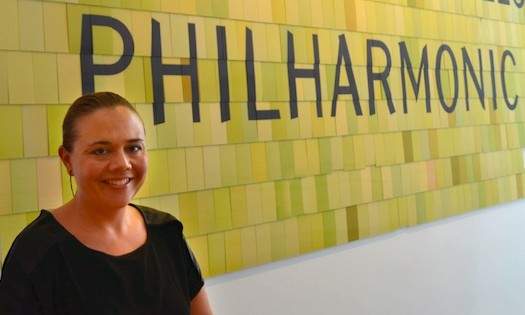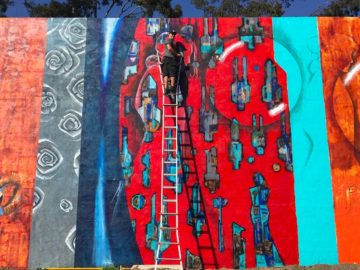
Gretchen Nielsen
LA Phil’s YOLA Launched into the World and onto the Super Bowl Stage
BY PAKSY PLACKIS-CHENG
Gretchen Nielsen, Director of Educational Initiatives, Los Angeles Philharmonic (LA Phil) is responsible for the organization’s portfolio of educational programs. One high-profile education program is the Youth Orchestra Los Angeles (YOLA), modeled after Venezuela’s El Sistema.
You may have seen the LA Phil’s YOLA perform at the recent Superbowl halftime show. LA Phil’s conductor Gustavo Dudamel conducting a group of young students.
The YOLA program provides free instruments, intensive music training, and academic support to students from underserved neighborhoods. YOLA has become a leader in music education and youth development.
Below is an interview with Gretchen Nielsen that was first published in the book, Impact X by impactmania’s Paksy Plackis-Cheng (May 2015).
Gretchen Nielsen and I met up in her office at the LA Phil’s administrative office, situated next to the stunning Walt Disney Concert Hall, designed by Frank Gehry. Afterward she showed me the beautiful rooftop garden, with a rose sculpture of smashed Delfts Blauw.
Besides being inspired by El Sistema and Gustavo Dudamel, why YOLA?
An interesting development over the course of the past five years is that we were interested in helping out children—the idea of intensifying activity and resources in a given neighborhood that is needy… helping kids be on a continuum of learning.
We created a YOLA neighborhood project out of existing programs. Now we have these zones of activity that involve kids who are deeply involved in music and are coming 11 to 17 hours a week to a YOLA site.
Do you still consider this a music program, or is YOLA moving toward youth development?
What’s interesting is when we started YOLA, the idea behind it was definitely youth development. The way we talked about it was more about music training. Over time, we developed a language and also a deeper understanding to talk about this as social imperative.
If you hear Deborah Borda [President & CEO, LA Phil], you’ll hear her talk about artistic imperative and social imperative, and how they both work together — and how they’re both so important for this orchestra to survive.
Internally, has the LA Phil embraced the fact that you’re more than putting on performances?
Education continues to be a big agenda item on any board meeting. However, the conversation has really shifted from making policy decisions to forming partnerships, — because we don’t do this work by ourselves. We partnered with two organizations at our first site: the Expo Center and Harmony Project. At our second site, we work with Heart of L.A., which is a community center.
The third site, which opens in January, will be at the L.A. County High School for the Arts. We will be part of their after-school hours. We share programmatic responsibility and financial responsibility. For example, the LA Phil offers incredible venues, guest artists, and artistic resources. The partners provide knowledge about the community, trust in the community, and recruit students. Together, we hire the teachers. However, the teachers sit within their organization, because they’re there on a daily basis. It’s a very complex venture agreement.
What are the key ingredients for a successful partnership?
You have to leave ego behind. It is actually like a romantic relationship, where you constantly have to revisit your beliefs and values. I also think you have to walk into a partnership knowing that you have some shared value. What are your reasons for wanting to get into this partnership?
Five years from now, where are you with all these programs?
It is all about breadth and depth. Deepen the footprint of the LA Phil in terms of our community-based and education-based programming. One of the things we’ve learned from Venezuela is bringing these huge events together: thousands of kids. I think over time, merging YOLA and other programs is certainly part of the vision…
Helping the community understand that we’re part of a larger ecosystem. When things change, there will be such a stake in the community around certain programs that they won’t go away, regardless of the LA Phil’s participation. We are certainly devoted to YOLA as a long-term proposition. We’re expanding into East L.A. in the winter this season. Beyond that, you know, we’ve talked about three to five sites.
What is needed for social change?
You have to have leadership that really believes in social change, and having Gustavo come to the LA Phil changed the culture of the place. Deborah Borda, who certainly was backing education, has had her own transformation over time… going to Venezuela and seeing what happened for 100,000 kids annually in this program.
Social change in South L.A is not going happen by importing people to the concert hall. You have to be in that community a lot. You can’t build community, and you can’t make change, without being with people for as many hours a week as you possibly can. We pushed our own comfort level, and what we thought was the community’s comfort level of intensity of programming.
But the more we offer, the more they want. We are seeing change: kid-by-kid, family by family… ways that I’ve never seen change happen through education programs. The intensity piece is key. We have teams of teaching artists, basically faculty at the sites, who are there almost the entire time. Then we have music teachers. We have social-service support at the sites. We have academic support.
Family participation is key. The great thing about having family support is that the families are changed by their experience. If you aren’t going to commit yourself to whatever help they need, you would be losing kids. We have had a 90 percent retention rate — that’s huge, especially for this intensive program. But if we didn’t offer snacks or meals or academic tutoring, it would be a different story.
What would you be doing if you weren’t doing this?
[Laughs.] This work has become so important to me. Building community is really important to me. If I were in another field, it would have to be something around social change or social innovation within the community.
Where does that come from?
I was very interested in getting people more interested in an art form at the time I was studying this opera. Now it’s orchestra. Very quickly, when you are in education, you start to see how this work can change people’s lives. Music and the arts changed my life. I grew up in rural Amish country in Pennsylvania, and had very good teachers and schools, but I didn’t have access to the highest-quality art in the world. However, I had people who supported me. I realize whenever I made a big life decision, I had a mentor helping me. Whether it was true or not, I realize people saw potential in me. It helped me take a certain path. I feel like we do that all of the time in the work that we’re doing here.
What can people do locally to support music education?
The democratization of music is going to be in schools. As a parent, it’s so important to advocate for getting arts back into schools, not just arts integration, but art. Make your voice heard. I’ve also seen really interesting connections between people who, for example, used to play clarinet, don’t play it too much anymore, started volunteering at one of our YOLA sites, and who now feel like they belong to this larger community. There are tons of volunteering opportunities. Of course, donating to any program that supports music education.
What is next?
One of the things that the LA Phil is trying to develop over time is when the LA Phil tours outside of Los Angeles, how do we bring the story of education with us. Last fall, we had a European tour. We created a symposium, and brought 10 of our YOLA kids. That was a life-changing experience, for all of them, but also, we brought some staff and teachers. It changed all of us, and we learned so much, because we realized what our kids don’t know, what else they need in life.
The future for us is helping our kids out of YOLA into the world.



